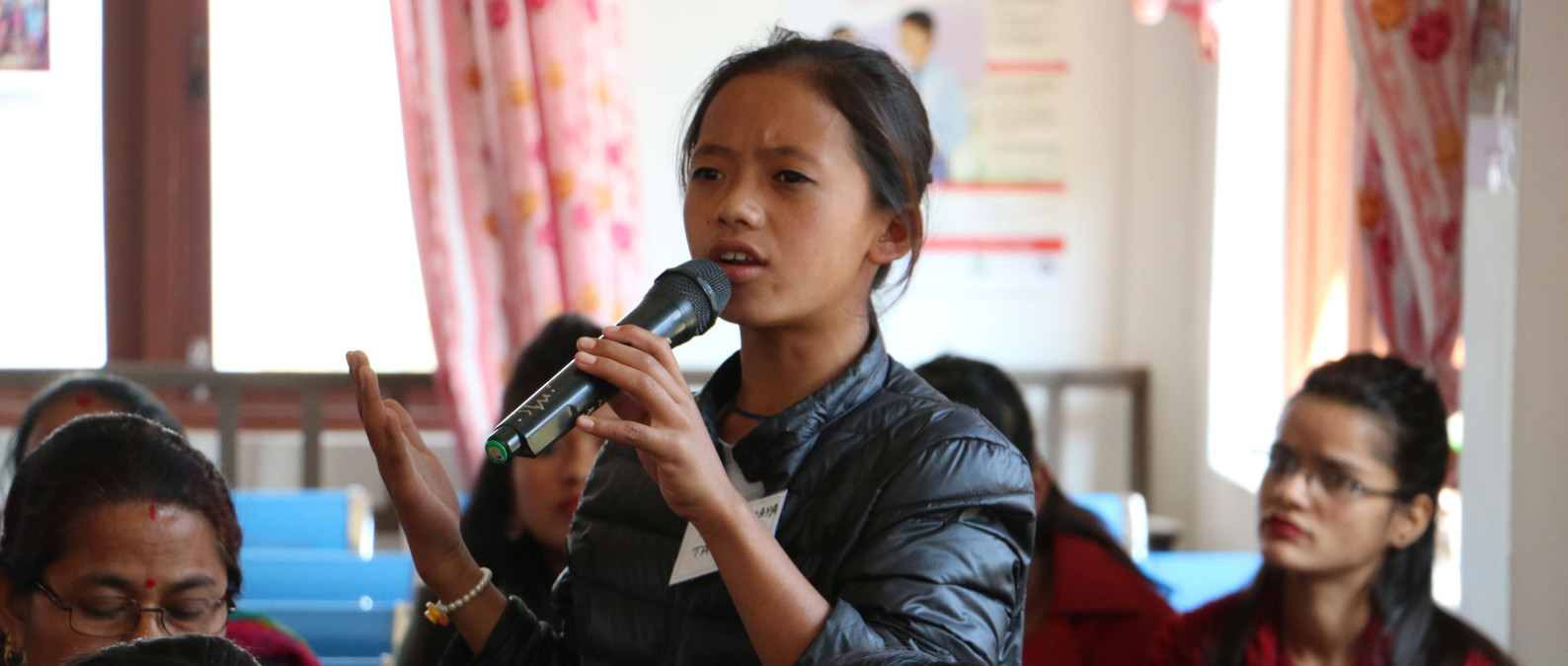Adolescent Advocates Dance and Call for Safe Schools, Safe Communities in Nepal
Published: Jan 3, 2018 Reading time: 5 minutes Share: Share an articleWith the orange ribbons tied on their wrists, Her Turn girls and His Chance boys started moving their hands with a dance step at Bus Park in Gorkha Bazaar, Nepal. Community members observed the flashmob. Passengers and drivers stopped the buses and watched the event with big smiles on their faces. School going children stopped for a moment and watched the performance on child marriage and violence. The performers’ voices carried the slogans loud: “Zero tolerance of violence”, “Marriage after 20 years of age”, “Stop violence, child marriage and human trafficking”. Everyone beamed with pride and led the flashmob weaving their hands with orange ribbon.

People in Need implements a part of Strengthening Access to Equitable and Fair (SAFE) Justice project in consortium with CARE - a part of IPSSJ, funded by UK aid. Hamro Palo, PIN’s implementing partner has been delivering the program in rural settings – in 2017 together we have reached over 2,100 adolescent girls with Her Turn workshops, 850 adolescent boys with His Chance workshops, 40 schools with our Safe School Trainings, trained over 250 youth resource persons and mobilized adolescent girls, boys and their schools to deliver 225 Safe School Projects. In December, to reflect on the achievements and challenges of safety and access to justice in schools, we organized two District Level Conferences.
District Level Conferences were platforms for girls, boys and schools to discuss their issues with government authorities, NGOs, other partners and each other. With the slogan "Safe school, safe community", three days long events were held on December 2nd-4th with 97 participants from 19 schools in Sindhupalchok district and December 9th-11th with 57 participants from 9 schools in Gorkha district. The agendas included working in groups to come up with ideas and develop recommendations for newly elected local government officials to improve quality of education, discussions of safety in schools, and panel discussion on access to justice. The conferences were attended by Police, Women and Children Office representatives and other guests.
The recommendations that the girls and boys developed will be shared with local governments and we hope will inform their plans. Some of them include: assigning focal persons or representatives at the local government to communicate with Girl Support Committees, School Support Committees, PTAs, SMCs, and schools and establish regular and close communication and collaboration between them; conducting regular meeting between schools and representatives and regular monitoring of school activities – teachers, SMC, PTA, and students – by the local government; and establishing effective and strong mechanisms to address various forms of violence, harassment and discrimination in schools, including that perpetrated by teachers: school related SGBV, corporal punishment, bullying, and others. Safety in school was a reoccurring issue – the girls and boys shared several cases of harassment perpetrated by teachers. "My teacher started touching my body, I started shaking. He pulled my bra strap and I was crying from inside, but could not speak a word," said one of the Her Turn workshop participants at the conference. Schools in Nepal are viewed as common places of threats to students and hence the need to ensure safe learning environment for all students.
Many girls and boys shared how they applied what they learned during the workshops in their lives. One His Chance workshop participant of class 8 said, "I used to tease girls and enjoy it. After learning about harassment and bullying during the workshop, I fear to tease girls. I think my comments or my words affect girls a lot. They might develop tension." Others shared how they use their newly acquired leadership skills – Sabina from Gorkha shared her experience of hosting the program during the closing ceremony. The appreciation she received motivated her to be more involved in leadership activities. The panel discussion on access to justice was an opportunity for the adolescent girls and boys to ask district government representatives and police directly about the reporting processes and holding violence perpetrators accountable. The participants used this platform to express their concerns related to access to justice, budget dissemination that should be allocated to address children’s needs, inefficient administrative procedures and involvement of government representatives in teasing and harassment.
In Sindhupalchok, many participants agreed that meeting the Vice-President of Jugal Rural Municipality, Ms. Shrijana Tamang, was one of the highlights of the 1st day of the conference. At 25 years old and coming from a remote village, Ms. Tamang is a role model for many girls and boys from rural areas. She shared her experiences of learning and becoming a young leader and encouraged participants to stand up for their rights. She also highlighted the need of investment in children as education provides the foundation for the development of other sectors. She shared her resolution on allocating more than 10 % of budget in children sector and requested everyone to participate in a local level meeting on budget allocation.
Linking adolescent girls and boys with their local justice service providers and government bodies ensures that the effects of the project will be sustainable – the young people met their district government representatives and will be able to communicate with them directly. Many participants also appreciated how good it was to meet other like-minded people who struggle with similar issues in their own villages.
To mark the 16 Days of Activism against Gender Based Violence, in both districts the adolescents participated in special public events. In Sindhupalchok, on December 4th, they conducted a rally in coordination with Women and Children Office, District Police, NGO Federation and other stakeholders. In Gorkha, on December 10th, they organized a flashmob with a choreographed dance that gathered audience from local community members. That’s where the participants were promoting violence free world, dancing and waving the bright orange ribbons on their wrists.








